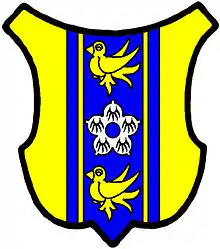endorse
English
Alternative forms
Etymology
Alteration influenced by Medieval Latin indorsare of Middle English endosse, from Old French endosser (“to put on back”), from Latin dossum, alternative form of dorsum (“back”),[1] from which also dorsal (“of the back”). That is, the ‘r’ was dropped in Latin dossum, which developed into Old French and then Middle English endosse, and then the ‘r’ was re-introduced into English via the Medieval Latin indorsare, which had retained the ‘r’. Note that the alternative spelling indorse also uses the initial ‘i’ from Latin (in-, rather than en-), but this form is now rare.
Verb
endorse (third-person singular simple present endorses, present participle endorsing, simple past and past participle endorsed)
- To support, to back, to give one's approval to, especially officially or by signature.
- To write one's signature on the back of a cheque, or other negotiable instrument, when transferring it to a third party, or cashing it.
- To give an endorsement.
Derived terms
Related terms
Translations
|
|
Noun

endorse (plural endorses)
- (heraldry) A diminutive of the pale, usually appearing in pairs on either side of a pale.
Usage notes
When a narrow, vertical stripe appears in a coat of arms, it is usually termed a pallet when used as the primary charge in the absence of a pale. The term endorse is typically used only when the stripes flank a central and wider pale. Diminutive stripes flanking other ordinaries are termed cottises.
Related terms
Translations
References
- “endorse” in Douglas Harper, Online Etymology Dictionary, 2001–2019.
- Oxford-Paravia Concise - Dizionario Inglese-Italiano e Italiano-Inglese. Maria Cristina Bareggi, ed. Torino: Paravia, 2003 (in collaboration with Oxford University Press). ISBN 8839551107. Online version at